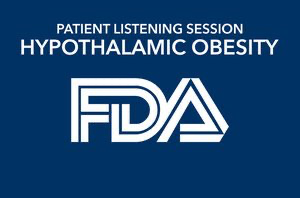The Raymond A. Wood Foundation (RAWF) whose mission is to empower hypothalamic-pituitary brain tumor survivors for improved quality of life by providing access to education, technology, and evolving treatments hosted a patient listening session with the Food and Drug Administration on October 22, 2021 to increase the understanding of hypothalamic obesity (HO) and the daily challenges faced by patients living with this rare disorder and caregivers.
What is a Patient Listening Session?
Patient Listening Sessions are small, informal, non-regulatory, non-public teleconference meetings that allow participants to connect with FDA staff first-hand and share patient experiences, perspectives, and needs related to their health or a disease. These sessions are not about specific medical products (drug, biologic, or device) and gives the FDA an opportunity to connect with under-represented communities.
These sessions are planned through the FDA’s Office of Patient Affairs and are attended by FDA reviewers across centers. A patient advocacy organization or advocate may request a listening session and, if granted, prepares and submits an agenda along with an outline of challenges around the disease and goals to accomplish in the session.
Who Attends Patient Listening Sessions?
Specific divisions/offices that indicated they wanted to attend are invited. Sometimes the division will designate 1 -2 people to attend on behalf of the division, and some will send their entire division. The meetings are small and focused to help it feel more comfortable for patients/caregivers to share. Members of the patient community are invited to listen.
Purpose of a Patient Listening Session
Patient Listening Sessions help the Agency inform medical product development, clinical trial design, patient preferences, and shapes regulatory thinking. During a Patient Listening Session, FDA staff will either ask questions or simply listen to better understand your experiences and perspectives. Only the FDA, patients, caregivers, advocates, and community representatives participate in the session.
Goals for Patient Listening Session for Hypothalamic Obesity
The goals of our meeting were to help the FDA better understand hypothalamic obesity as a rare disease and its implications.
These goals included understanding of:
-
The burden of living with the disease, especially after surviving a brain tumor
-
The impact on families including siblings
-
The depth of burden on caregivers
-
The social implications of HO
-
The distinction between HO and typical obesity
-
The challenges faced by doctors when treating patients
-
The unmet needs and the need for treatment options
Increasing Awareness of Hypothalamic Obesity
In an effort to grow awareness around HO, how it is different from typical obesity and the need for research and treatment innovations, RAWF requested a patient listening session in the spring and submitted an agenda of presenters with various perspectives on HO from survivors to caregivers and researchers.
Presenters included:
-
Amy Wood, executive director of RAWF introduced the speaker panel and provided an overview of HO.
-
Dr. Shana McCormack of Children’s Hospital of Philadelphia shared information from a clinical perspective on diagnosis, treatment challenges and quality of life outcomes.
-
Catherine St. James, a craniopharyngioma survivor shared her experiences with growing up with HO and how it impacted her particularly socially.
-
Marci Serota, registered dietician nutritionist and mom to Jake, an HO patient discussed HO vs. standard obesity and the impact of diet and exercise.
-
Eugenie Hsu, Ph.D. caregiver and son Alex Riley, a teenager living with HO and hyperphagia, explain the burden on caregivers and families. Alex gave his perspective on the desire to obtain food at all costs including stealing and hoarding. They also discuss their experimental research with oxytocin and naltrexone in treating Alex’s symptoms.
-
Jeannette Ryals was diagnosed with a craniopharyngioma in adulthood. Prior to treatment, she was an exercise enthusiast and marathon runner but immediately developed hyperphagia after treatment and subsequent weight gain despite her efforts with diet and exercise. She provides her perspective on the challenges of living with HO.
-
Chris Selko shared the challenges faced in caring for AJ, a young adult living with HO and hyperphagia and the impact on family and siblings. She discusses all of the efforts made to treat AJ’s HO symptoms with various off label drugs and clinical trials with no success.
Conclusion
The Patient Listening Session on HO took place from 1:30pm – 3:00pm ET on October 22, 2021. The panel of presenters took questions from the attendees. Overall, the session was well attended and the panel felt positive that all key points around challenges with this condition were covered.
“Hosting this Patient Listening Session was a great opportunity to share our “in the trenches” experiences battling hypothalamic obesity directly with those people who will be making decisions around future treatments. Having the FDA understand how deeply these challenges affect our daily lives while putting faces to this disease can only help increase the opportunities for research, treatments and hopefully a cure.”
Patient Listening Recap
The Raymond A. Wood Foundation has prepared a summary that is currently on the FDA website. Additionally, we hosted a webinar to recap the meeting. RAWF will continue working to raise awareness around HO and advocate for future treatments.


